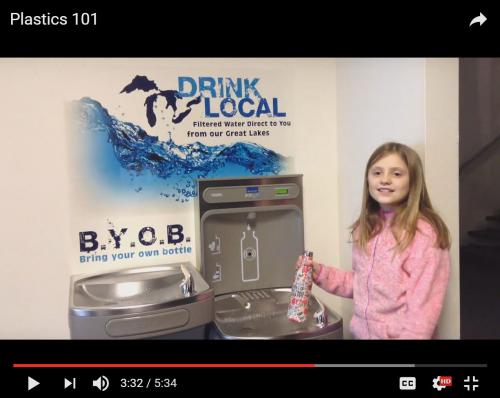Student video promotes awareness of Great Lakes marine debris
While plastic monsters invade Michigan’s Great Lakes and inland waterways, Alpena Elementary students create video to foster awareness of this issue among their local community.

What is marine debris? It’s essentially human-made trash – large and small – that finds its way to oceans, our Great Lakes and inland waterways. A group of fifth-grade students from Alpena, Mich., want to help everyone understand what it is and what can be done to fight this problem. They created a movie and offer ideas about how everyone can contribute toward solutions. Watch their student-created film at: http://bit.ly/Plastics101.
The National Oceanic and Atmospheric Administration (NOAA) has championed an initiative to foster awareness, understanding, and citizen engagement in a growing issue of marine debris in our oceans and inland waterways. Through the Northeast Michigan Great Lakes Stewardship Initiative (NEMIGLSI) network, Michigan Sea Grant, Michigan State University Extension, and the NOAA Thunder Bay National Marine Sanctuary are partnering with schools, educators, and youth leaders to raise local awareness about this Great Lakes problem.
How did these students get involved?
In fall 2016, Bob Thomson’s Ella M. White Elementary fifth-grade students visited Thunder Bay River, where they used nets to trawl for plastics, and were shocked to find microplastics in our Northeast Michigan watershed. After analyzing samples from the river, fifth-grader Tucker Bright said, “If there are this many microplastics in this little sample, just imagine how many there are in the Great Lakes!” To raise awareness about finding plastics in the river and finding solutions to this problem, these Alpena Public Schools students developed a film, “Plastics 101.”
Through the NEMIGLSI network, they worked with community partners, including Huron Pines AmeriCorps, Michigan Sea Grant, and Thunder Bay National Marine Sanctuary, to complete the film. The effort also was supported by DonorsChoose.org through Tom’s of Maine Green Your School Campaign.
Before filmmaking, the students researched the topic of marine debris and found that microplastics are a problem in both our Great Lakes and oceans. The students consulted with fisheries expert, Brandon Schroeder (Michigan State University Extension, Michigan Sea Grant Educator), and
‘Plastics 101’
The film “Plastics 101” emerged with entertaining insights into the troubles of a throwaway culture and the effects on the Great Lakes and oceans. Students also learned about potential career options while applying classroom learning goals. Thomson said, “The video provided a perfect opportunity to develop a cross-curriculum project that focused on targets from English Language Arts, Science, and Social Studies.” Thomson recently was named 2017 Michigan Science Teacher Association Elementary Science Teacher of the Year.
Students also learned more about how their actions impact their community and ultimately the world. When plastics are improperly disposed, they could end up in a local stream, river, or the Great Lakes by the wind, rain, and through storm drains. Students were surprised to learn plastics absorb toxins, such as DDT, PAH and PCBs, and that these toxins can enter our food web through plastics. Since plastics don’t biodegrade, they don’t go away; they simply photodegrade into tiny pieces that can be consumed by plankton or small fish and then move up the food chain. To showcase solutions to this problem, the students highlight how to take action and protect our Great Lakes and ocean.
“Plastics 101” now will serve as an educational tool through the Northeast Michigan Earth Day Bag Project, an effort where third-, fourth-, and fifth-graders learn about the harms of single-use plastics to our Great Lakes and ocean and solutions to this growing problem. After watching a series of short films and discussing the information, students across northeast Michigan will decorate paper bags with conservation messages (e.g. Refuse to Single Use; Protect our Great Lakes), which will then be distributed to customers at local grocery stores on Earth Day, April 22, 2017.
Michigan Sea Grant and Michigan State University Extension serve in providing leadership for the NEMIGLSI network, which is part of a larger, statewide network and partnership, the Great Lakes Stewardship Initiative (GLSI). Established in 2007 with funding from the Great Lakes Fishery Trust, the GLSI supports place-based stewardship education in schools and communities across Michigan. Partnerships are invaluable in our endeavor to support stewardship of our Great Lakes and natural resources. Through the NEMIGLSI network, and applied place-based education strategies, our students may perhaps prove the most inspirational educators of all in addressing important Great Lakes issue such as marine debris.
Michigan Sea Grant helps to foster economic growth and protect Michigan’s coastal, Great Lakes resources through education, research and outreach. A collaborative effort of the University of Michigan and Michigan State University and its MSU Extension, Michigan Sea Grant is part of the NOAA-National Sea Grant network of 33 university-based programs.



 Print
Print Email
Email

